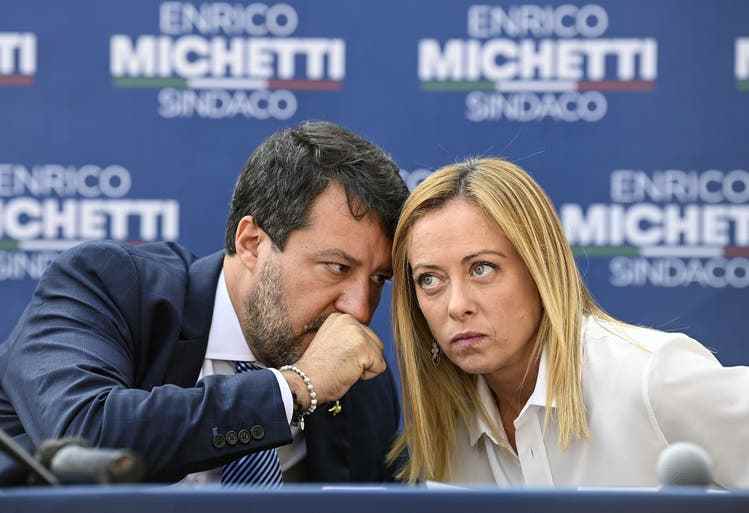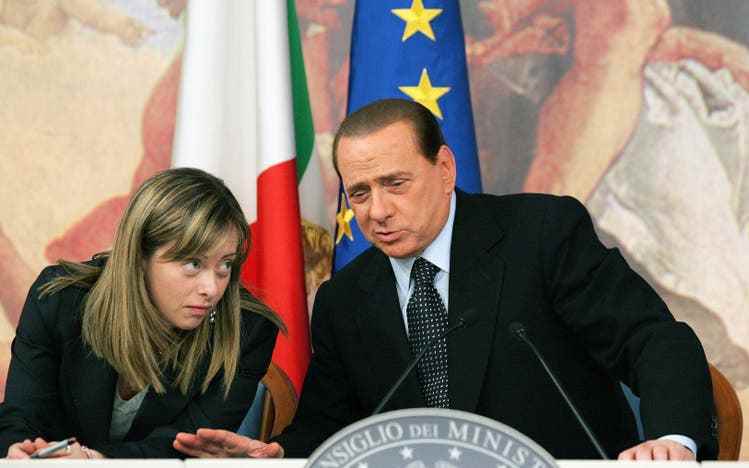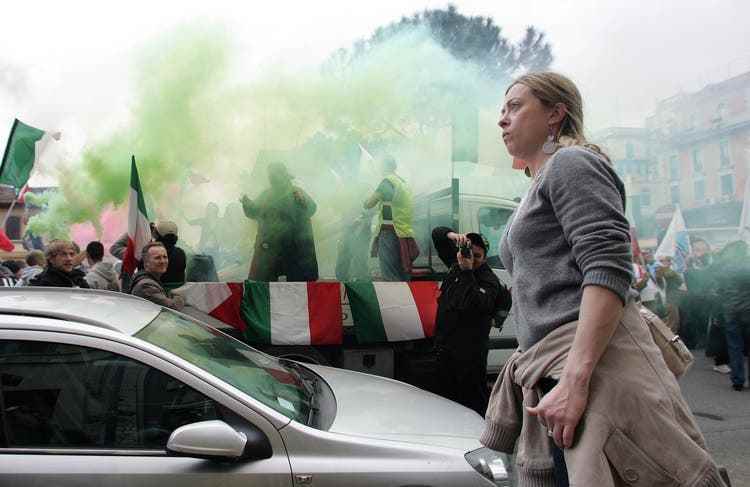Antonio Masiello/Getty
Only a few people abroad know the 45-year-old, but the shrill right-wing politician from the Roman working-class district of Garbatella has been involved in Italian politics for decades.
Just a few years ago, nobody would have believed that Giorgia Meloni of all people could be the first woman to move into the Palazzo Chigi, the government palace in the heart of Rome. Her Fratelli d’Italia got a few percentage points each in national elections, and because of her fascist roots, the politician with the unpolished Roman muzzle did not seem acceptable for the most important political office in the country.
The girl from Garbatella
Their victory was made possible because all other parties have tried to govern since the last elections and have not done particularly well. There was also some luck involved. If Lega boss Matteo Salvini hadn’t gambled away his popularity so arrogantly, he would probably be at the head of the victorious right-wing camp. But Meloni has also worked harder than anyone to get there.
Only at school, which she graduated with top grades as a teased, overweight girl. Then in the rough, male-dominated environment of post-fascist youth organizations and parties.

Lega boss Matteo Salvini hasn’t taken his ally Giorgia Meloni seriously for years, now she’s the strong woman on the right.
Giorgia Meloni was born in 1977 in a wealthy district in the north of Rome and learned as a child that nothing in life comes for free. The father comes from a middle-class family and works as a tax consultant. However, when she and her older sister Arianna are very young, he leaves the family to sail around the world and then settle in the Canary Islands.
For the mother, the separation means a painful social descent. She has to move from the spacious family house in the north to a small apartment in the working-class district of Garbatella in the south of the capital, where her parents also live. She works, the girls spend a lot of time with their grandparents. As a politician, Meloni will later emphasize her Garbatella origins at every opportunity to make it clear that she is one of the people.
An absent father and great ambition
The father showed little interest in his two daughters throughout his life. One can well imagine that the younger one turned to the right spectrum in protest against him, who voted communist. Her father’s absence seems to have shaped her life in other ways as well. In her autobiography “Io sono Giorgia”, published in 2021, Meloni herself writes that the constant urge to achieve something and to be accepted, especially in a very masculine environment, is probably a result of her father’s lack of attention.
At the age of 15 she joined the youth movement of the Movimento Sociale Italiano, a party founded in 1946 by former exponents of the fascist regime, which was merged into the Alleanza Nationale (AN) in 1995. In this movement on the extreme right, she finds a new family, she belongs somewhere again.
Instead of enjoying life like other teenagers, Meloni takes part in demonstrations and debates with right-wing comrades. She works as a babysitter, in bars and as a cloakroom lady. Later also as a journalist for the mouthpiece of the post-fascists, the newspaper “Secolo d’Italia”.
As the youngest in Parliament and in the cabinet
In 2004 Meloni became president of the youth wing of the AN. She is the first woman to head a youth organization of the extreme right. Two years later, with the help of her mentor, AN boss Gianfranco Fini, she was elected to the House of Representatives. At 29, she is the youngest in the chamber and even becomes its vice president. When Silvio Berlusconi became prime minister for the fourth time in 2008, Meloni became the youngest minister in the history of the republic to take over the youth dossier. She works doggedly and is also appreciated by left-wing colleagues.

In 2008, Silvio Berlusconi brought Meloni into his cabinet. At 31, she is the youngest minister in the history of the republic.
Until 1994, the heirs to fascism were treated as pariahs by all other parties. Berlusconi breaks this taboo by including them in his right-wing alliance and thereby making them socially acceptable. The fascism debate divided Italy’s politics for decades afterwards.
Meloni, who as a 19-year-old had described the fascist dictator Mussolini as “the greatest politician of the last fifty years”, is more critical of history as a young minister and presents herself as a representative of a modern right-wing force that upholds the rights and values guaranteed in the constitution .
In 2009 the AN dissolved and became part of Berlusconi’s Popolo della Libertà. However, the egomaniacal patriarch leaves little room for young people. In 2012, Meloni left the party with other dissatisfied people, founded the Fratelli d’Italia and thus returned to the post-fascist tradition. Their “brothers” adopt the old party symbol, a flame in the colors of the Italian tricolor, symbolizing the eternal fire on Mussolini’s tomb.

Giorgia Meloni during a right-wing rally in the southeast of the Italian capital.
In order to appeal to broader sections of the electorate and to reassure the western European partners, Meloni has recently visibly tried to shake off this past. For her party, fascism belongs to history, she explained, among other things, in an address to the foreign audience Video. However, the highly symbolic flame continues to adorn her party logo, and many of her fellow campaigners are still close to the extreme right-wing milieu.
The closest circle around Meloni has remained the same since the militant times in Rome. He includes Francesco Lollobrigida, leader of the Fratelli parliamentary group in the Chamber and husband of Meloni’s sister. As a member of the government of the Latium region, he had, among other things, the construction of a mausoleum for Rodolfo Graziani, the fascist general whose name stands for the serious war crimes of the Mussolini regime in Ethiopia. Loyal companions have been one of Meloni’s strengths so far, but could become an Achilles’ heel in the future.
Underestimated by their macho partners
In the 2013 elections, Meloni’s new party won just under 2 percent. In 2018, the Fratelli still played a marginal role with just over 4 percent. Her coalition partners, Berlusconi’s Forza Italia and Salvini’s Lega, dominate the right-wing camp and take the junior partner little seriously.
In 2016, the pregnant Meloni ran for mayor in Rome. During the election campaign, she has to listen to a lot of misogynist slogans. The cheeky right-wing politician was already much more popular in her hometown than at the national level. Your 20 percent is not enough for victory, but Meloni is no longer a political fringe phenomenon.
Their daughter Ginevra was born in the same year. Meloni explains in interviews that the long-awaited child has changed everything. Politically she is as active as ever. However, she now brings Ginevra into play remarkably often in her speech, for example when it comes to school politics or Covid vaccinations for children, which she is critical of.
God, country and family
The 45-year-old is not married. She appears to be living an emancipated relationship with her Milanese partner Andrea Giambruno, a news presenter from Berlusconi’s Mediaset empire. Which doesn’t fit in at all with their dogged struggle for arch-conservative ways of life and Christian values.
In addition to God and fatherland, the traditional family is the top priority in Meloni’s rhetoric. She speaks of the “natural” family and agitates against the “gay lobby” and “criminal” migrants in front of the relevant audience. It may come as a surprise that she of all people, who had anything but an easy childhood as a child of divorce, fights so doggedly for traditional family structures.
A majority of Italians agree according to polls Melonis does not support conservative values regarding abortion or same-sex partnerships. The fact that she received by far the most votes on Sunday can be explained by the fact that she is perceived as an unused force, even though she has been politically active for thirty years. But her victory also seems to have something to do with the fascination of a woman who worked her way up the macho Italian political circus on her own.

Meloni during an election rally in Milan. Their base used to be mainly in the south, but the leader of the Fratelli d’Italia can now also mobilize the masses in the north.
in one Interview with the «Corriere della Sera» Meloni said she always felt like she wasn’t enough. As if what she does is never enough. She always wants to do better – and better and better. But maybe that’s her luck and will help her keep her feet on the ground.
In fact, Meloni should not fail like many of her male predecessors due to overconfidence. Her biggest problem is that she only made it to the top by whitewashing her past and toning down her rhetoric. There is a wide gap between what the hard core of her right-wing supporters want and what she has promised to more moderate Italians and European partners. But ambiguous positions become a problem as soon as one leaves the opposition bench.
